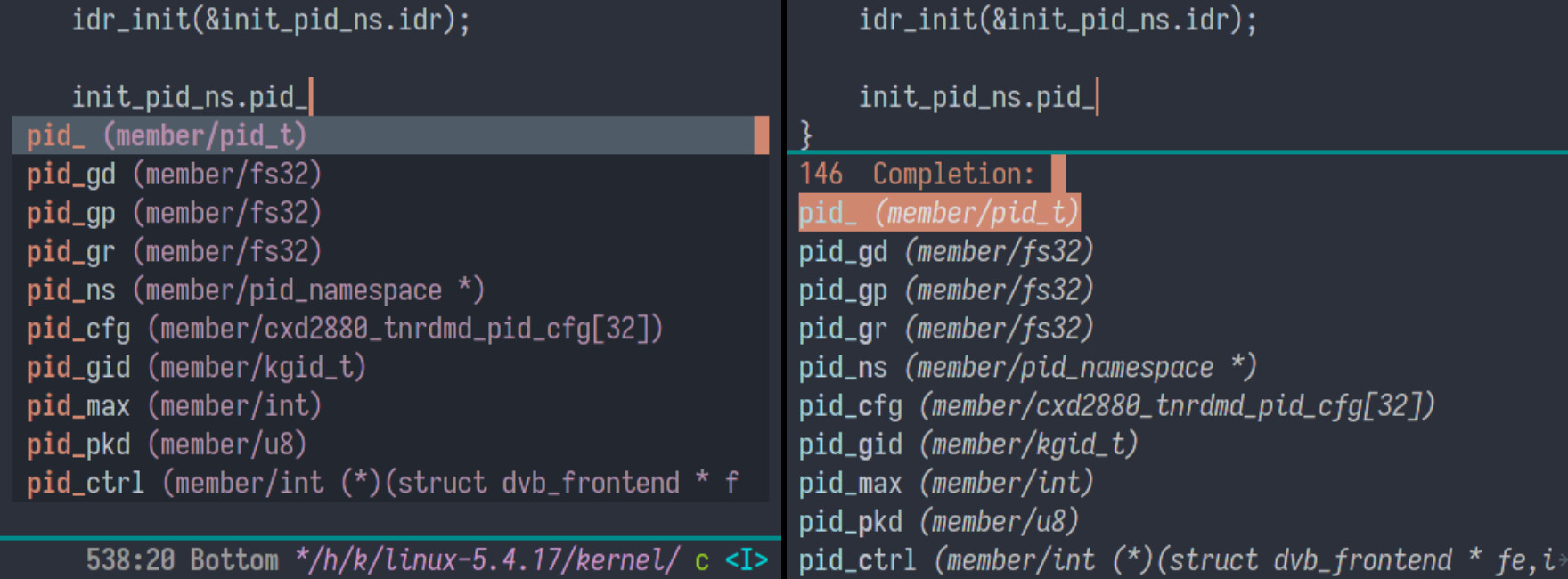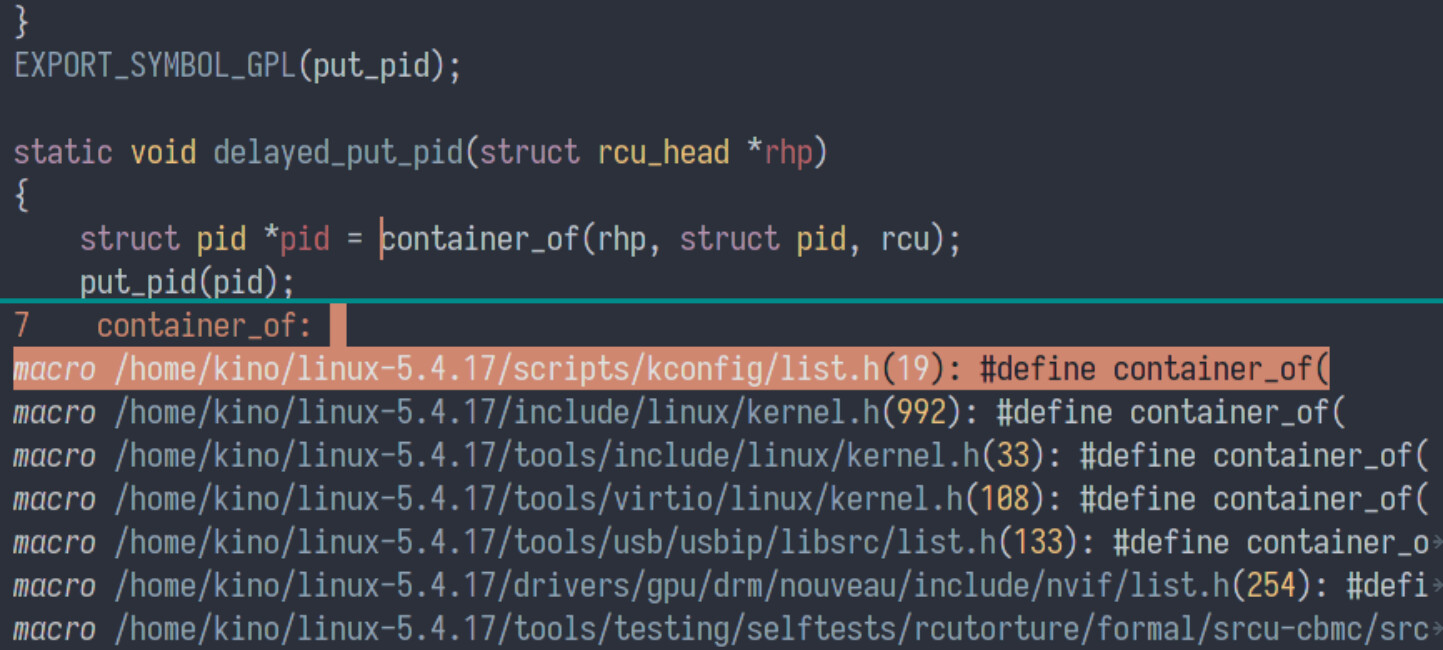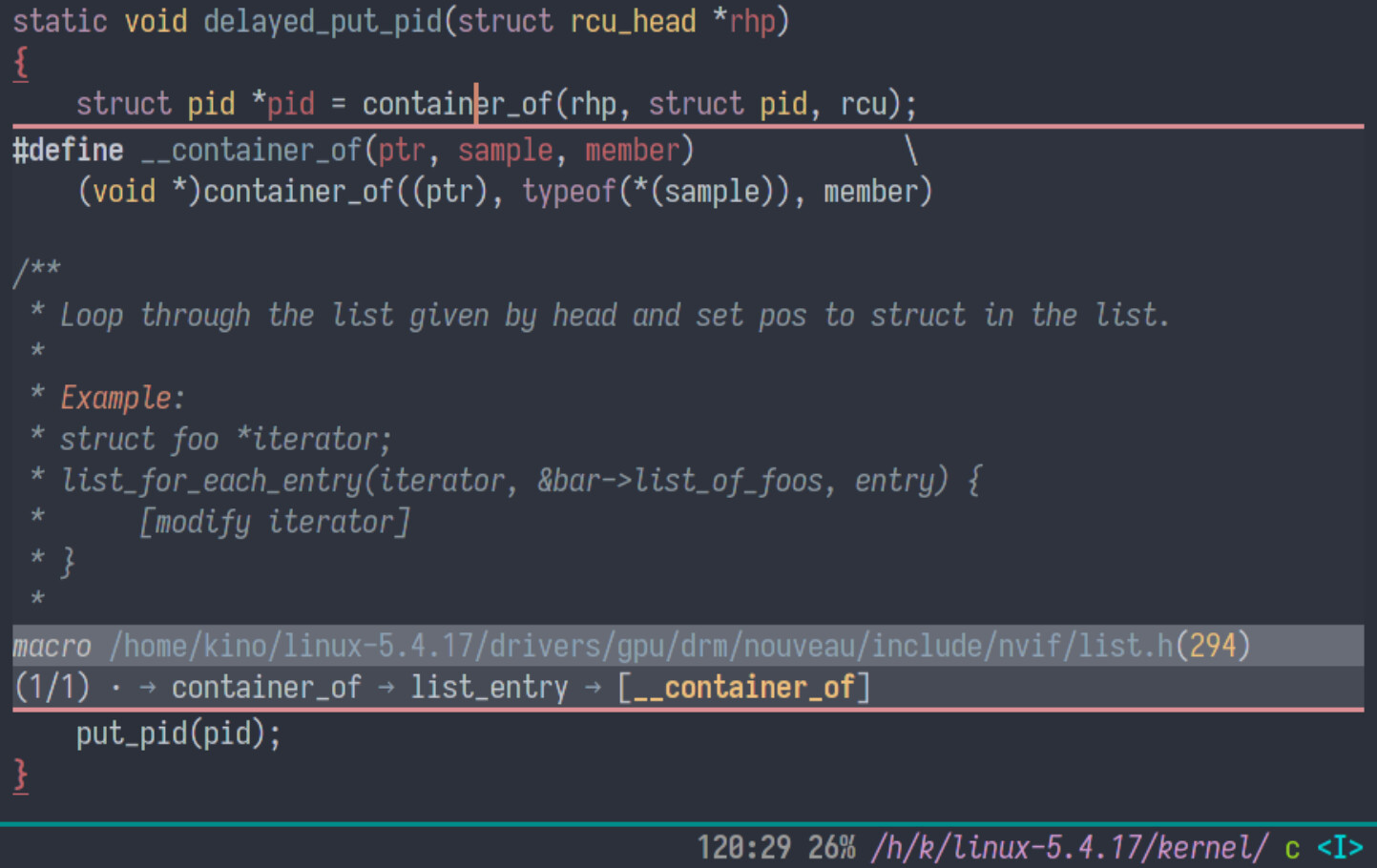Ctags IDE on the True Editor!
Citre is an advanced Ctags (or actually, readtags) frontend for Emacs. It offers:
completion-at-point, xref and imenu integration.citre-jump: Acompleting-readUI for jumping to definition.citre-peek: A powerful code reading tool that lets you go down the rabbit hole without leaving current buffer.
Let's see them in action!
-
completion-at-point, with the UI of company and Selectrum:Notice the rich annotations. Candidates are annotated by
(kind/type), so you know "it's a struct member withpid_ttype", etc. This is because Ctags "tags" format records much more abundant info than the etags "TAGS" format.Also, notice that candidates with the "member" kind are put above the others because we are in a C source file, and the current symbol is after a dot. Citre guesses that you want a struct member.
-
citre-jump, withcompleting-readUI provided by Selectrum: -
citre-peek. It opens a "peek window" to show the definition of a symbol:And there's more. Notice the code reading history at the bottom of the peek window. Do you hate having to switch between a lot of buffers while reading code? With
citre-peek, you can peek a symbol in the peek window. This allows a tree-like code reading history, that you can browse and edit, without leaving current buffer!
All above screenshots were taken in a huge project (the Linux kernel), and Citre is still fast, because readtags performes binary search on the tags file.
Citre requires readtags program provided by Universal Ctags. The minimal version is:
- commit
31d13e85, or - weekly release p5.9.20200124.0
It's recommended to get the latest version, as Citre actively takes advantage of its latest features. Also, the ctags program provided by Universal Ctags is recommended for creating your tags file.
-
For GNU/Linux users: If you install ctags from your software repository, run
$ ctags --versionto see if you are using Universal Ctags. The version is a little hard to inspect since Universal Ctags doesn't have a formal version number yet. If it's compiled before Jan 21 2021, it will probably not work. You can build it yourself, or try the snap package. -
For macOS users: Follow the instructions here to install the latest version.
-
For Windows users: Download the binary here. Ctags in cygwin (or msys repo of msys2) won't work since it doesn't come with readtags. Ctags in the mingw64 repo of msys2 is Universal Ctags, but by the time of writing, it doesn't meet the version requirement.
If you don't have readtags executable in your PATH, customize
citre-readtags-program to the path of it.
If you use Citre's command to create tags file, you need the ctags program
provided by Universal Ctags. If you don't have it in your PATH, customize
citre-ctags-program to the path of it.
This is not necessary for all other functionalities of Citre.
You can install citre from MELPA. Below are instructions
to manually install Citre.
-
Clone this repository:
$ git clone https://github.com/universal-ctags/citre.git /path/to/citre -
Add the path to your
load-pathin your Emacs configuration:(add-to-list 'load-path "/path/to/citre")
-
Require
citreandcitre-configin your configuration:(require 'citre) (require 'citre-config)
Or, you can read citre-config.el, and write your own config.
Open a file in your project, type M-x citre-update-tags-file. If it can't
find a tags file in the cache directory, it'll guide you to generate one.
Once you've created such a file, run M-x citre-update-tags-file again to
update it, or run M-x citre-create-tags-file to recreate one.
You could choose a cache dir from citre-tags-file-cache-dirs. The default
values are:
~/.cache/tags/./.tags/, relative path means it's expanded against your project root. The project root itself is detected bycitre-project-root-function.
They are chosen to not pollute your project directory or VCS.
If you want finer control over the tags file output, or you use other programs
that can generate tags file like hasktags or gotags, you need to use the
command line.
We'll still talk about Universal Ctags here. It can generate very informative tags files, and Citre makes use of it to provide better results. To generate an informative tags file, run this in your project root:
$ ctags --languages=c,c++,... --kinds-all='*' --fields='*' --extras='*' -RThis creates a tags file. When Citre seeks for a tags file, if it can't find
one in the cache dir, it searches from the current file, up directory
hierarchy, for a filename in citre-tags-files. tags is a filename in it's
default value, so it can be found.
See this user manual to know more about tags file format, how to tweak the info included in a tags file, how to specify which dir uses which tags file, etc.
Note: Emacs users are more familiar with the TAGS format. TAGS format is
generated by etags or $ ctags -e, and Citre doesn't support it.
Citre supports the tags format, which is the default format used by Ctags. Simply puts it, tags format is much more informative than TAGS format, making Citre a much more powerful tool. See this user manual for details.
Note for Windows and macOS users: Windows and macOS uses case-insensitive file system by default, so this may happen:
- Ctags creates a tags file named
tags, by default. - Some plugins like
projectiletries find and load aTAGSfile, which is the default file used by Emacs etags. - Since
tagsandTAGSare the same to the file system, they tries to load thetagsfile, which can't be recognised byetags.el. - You'll see a "TAGS is not valid tags table" error.
To avoid this problem, you could create a tags file named .tags:
$ ctags -o .tags --languages=c,c++,... ...Or just use citre-update-tags-file.
Use citre-mode to enable completion-at-point, xref and imenu integration.
If you also use company, make sure company-capf is in company-backends.
By default, citre-mode is automatically enabled when you open a file, and a
tags file can be found for it. If you don't use citre-config, you can put
this in your configuration:
(add-hook 'find-file-hook #'citre-auto-enable-citre-mode)citre-jump and citre-peek works without citre-mode. Type M-x citre-jump
on a symbol to jump to its definition, M-x citre-jump-back to go back in the
jump history. About citre-peek, See this user
manual to know how to use it.
Here's a example configuration using
use-package. Be sure to read it
and tweak it to your own need.
(use-package citre
:defer t
:init
;; This is needed in `:init' block for lazy load to work.
(require 'citre-config)
;; Bind your frequently used commands.
(global-set-key (kbd "C-x c j") 'citre-jump)
(global-set-key (kbd "C-x c J") 'citre-jump-back)
(global-set-key (kbd "C-x c p") 'citre-ace-peek)
:config
(setq
;; Set this if readtags is not in your path.
citre-readtags-program "/path/to/readtags"
;; Set this if you use project management plugin like projectile. It's
;; used for things like displaying paths relatively, see its docstring.
citre-project-root-function #'projectile-project-root))See this user manual to know more customizable options.
This chapter in the developer manual talks about the strengths/weaknesses of ctags, and the design principle of Citre. Non-developers are also encouraged to read it to know more about these tools.
-
Q: What are the advantages of Citre & Ctags over etags, gtags, language servers...
A: See this documentation.
-
Q: How to use Citre over TRAMP?
A: Make sure you've installed readtags on the remote machine, and everything will just work.
-
Q: Why doesn't Citre support automatically update tags file?
A: Citre uses both line number and a search pattern to locate a tag. When the file containing the tag is edited, Citre could still locate the tag using the search pattern. Citre even tries to locate the tag when the line containing the tag itself is edited.
So, jumping to definition is still useable when the file is edited. There's no need to frequently update the tags file.
You may ask "what if I add new definitions, or modify/delete existing ones?" The truth is, if your codebase is reasonably large that you have to index them by Ctags, then small edits won't cause much trouble. You can just regenerate the tags file when needed.
-
Q: How many languages does Citre support?
A: Citre supports all languages that Ctags support. The latest Universal Ctags support 134(!) languages:
$ ctags --list-languages | wc -l 134
Besides, you could define your own parser using regex to support more languages.
-
Q: But seems for now Citre only has support code for C...
A: No matter what's the language, as long as you have a tags file for it, then Citre works out of the box. Language-specific support is for extra minor goodies, see the "Commentary" section in each language-support code file.
Citre is in its alpha stage. The authors are still exploring the designing and usage of the tools provided by Citre, so we may introduce some breaking changes.
That said, I've put much effort polishing the tools, and have been using it daily for a long time. Citre is useable, and offers great tools, so just try it!


